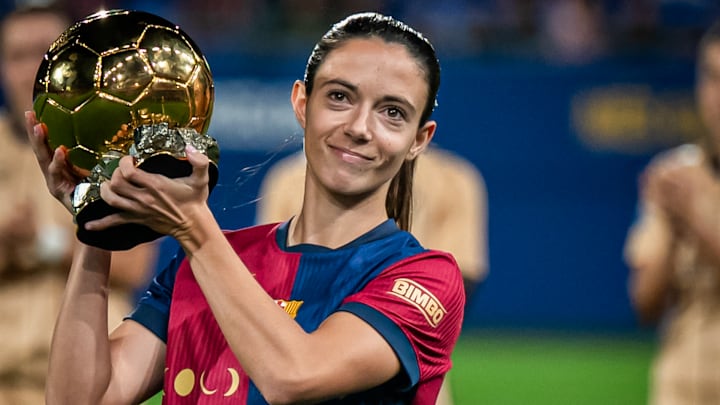Aitana Bonmatí is one of the biggest names in women's soccer right now, and off the pitch, she speaks with exceptional lucidity. After winning her second consecutive Ballon d'Or, the 26-year-old Barcelona star underlined further how women's soccer stands a notch below in Spain compared to leagues such as the NWSL in the United States and the WSL in England. Her words put women's soccer development into immense context, begging an important question of what needs to shift for other leagues to come closer.
Follow MLS Multiplex on X (Twitter).
For Aitana, how women's soccer is treated in the U.S. and England is the bar. "The league in the United States does well in promotion and communication, while they want to be the best, as in England," she said to ESPN. That she looks upon the NWSL so highly is no surprise, as it has become well known to be one of the most organized and professional leagues in the world.
Success for the NWSL isn't just about star players and awards. The league knows that if there is going to be any growth, women's soccer needs to be like every other product-commercial. It needs to put money into infrastructure, marketing, and reaching out to fans. As Bonmatí so rightly said, "It is not that the sport has to reach them but the system has to create those conditions such that the fan comes to it, the sponsor comes to it, and the talent comes to it." Spain Falling Short of the Ideal

While the NWSL moves forward, Spain's Liga F seems stuck. Even as Barcelona dominates the Champions League and even with historic titles from Spain's national team, like the World Cup and Nations League, dominance hasn't reflected in the domestic league.
Aitana didn't save her words: "The truth is that I am not happy with how they treat us because I believe they have a product. The players, a good product-we are triple Champions League winners, winners of the World Cup, and the Nations League." She believes that Liga F can be different, but without plans to make the most out of its triumphs and convert them into structural and economic development.
She is also saddened by the lack of competitiveness. "I would like to have a more competitive league because that's better for the people watching us and also for us to improve each year. If you compete in a strong league, you can face the best players, the best teams, and you can get better."
Who's Responsible?
One of the most striking declarations from Aitana points a direct finger at those responsible for the present state of women's football in Spain. "We're speaking loudly and clearly, saying what we need, but at least we do our job on the field. Who has to do their job off it? We're not in charge. We're not those people."
Her comments brought up one of the most pervasive issues that prevent leagues from being all they can be: absent or uninterested leadership. Unless decision-makers can become unindifferent or take action, such change will always be over the horizon.
She concluded with a sentence that should echo through every boardroom in sport: "They also have to want to, because if you want, you will. If you don't care, [you won't]."

NWSL and Global Competition
Aitana also had one profound comment regarding the changes in how competitive women's soccer has become globally. While the NWSL has established itself as one of the most popular leagues, the gap in teams from one country to another is much closer together now. She has said that she knows the gap between the USWNT and other teams does not remain huge. "I think in past tournaments, the U.S. was the only favorite, and I don't see that now," she said. "Now there's equality, and that can be surprising sometimes."
The underwhelming performance of the USWNT in the last World Cup underlines this shift. Even then, the team rebounded under a new coach, Emma Hayes, to win Olympic gold and proved that the NWSL is still a cornerstone for developing talent in the U.S.
What Makes the NWSL Special?
Reasons for its success can be boiled down to a few simple strategies that the NWSL has pursued:
- Investing in infrastructure and marketing: The league, since its inception, has given much significance to creating proper stadiums along with running campaigns that attach fans to the game.
- Player valuation: From Alex Morgan to Megan Rapinoe, the stars are not just aligned on the field but amplified as cultural icons to bring in fans from outside the confines of traditional sports.
- Competitiveness and balance: The league is designed in such a way that it doesn't get dominated by one or two clubs; hence, the matches can be exciting right from the start to the end of the season. Community involvement: Through support for social causes and deep involvement with the local community, NWSL has created a brand that stands for more than just sports.
These are the league's pillars that, far from weakening it, contribute to positive consequences in USWNT development and create a good circle affecting players and spectators alike.
